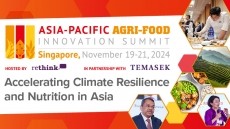Cultivated product funding: Ex- Beyond and Impossible Foods VC boss on what helps secure investment

According to Lever VC Managing Partner Nick Cooney, the fund recently grew to around US$55mn as of time of publishing, and of its multiple recent investments, four have been based in Asia, three of which are cultivated product firms.
“We led the pre-seed funding round for Singapore-based TurtleTree Labs which is the world leader for cultivated dairy, for Avant which is the leading cultivated seafood firm in greater China and most recently for CellX which is the first cultivated meat start-up in China and just entered the market last summer,” Cooney told FoodNavigator-Asia.
“We provide value to the firms in our portfolio in a variety of ways from fundraising to branding and publicity to general got-to-market strategy. For cultivated product firms, the brand strategy is particularly important at this point as they don’t have products yet and are still in the R&D phase, but there is a lot of value to building their brand and getting their names out there in the interim.”
The partners behind Lever VC are well-known for having previously invested in multiple leading alternative protein companies including Beyond Meat, Impossible Foods, Eat Just, Mosa Meats, Aleph Farms and various other well-known names.
When it comes to making selections for firms with cultivated products, Cooney revealed there are certain criteria which are clear indicators of the potential of success.
“For us, we like firms that have a pioneering technology in the space they are in, and are focusing on a broad geographical region, and this is reflected in our portfolio,” he said.
“For example, CellX is the first cultivated meat firm targeting China, TurtleTree Labs is the first cultivated dairy firm in the region – there are a lot of firsts in our portfolio because all these firms will need to raise significant capital to do the R&D they need to bring their price points down, to do this they need attention and we have seen from experience that having pioneering tech in a broad geographic region is very valuable in this regard.”
Another important area of focus for cultivated meat firms is the all-important cost element – although it may not be possible for price parity to yet be reached at this stage, having a clear strategy to reach this – and plans on what to do in the meantime – are crucial for a start-up to stand apart in its commercial potential.
“Having a clearer pathway to price points that will work in the market is also important, and we have found that there are two types of firms that fit into this: The first are those focusing on ingredients or blended products as these can reach parity more quickly, and the other is firms with [both short term and long term commercial plans],” said Cooney.
“By this, I refer to firms that have their eye on a large animal commodity market in the long run, but in the short term are able to have products fit for other industries at a lower price point than their competitors.
“For example, Avant is looking at cultivated fish meat in the long term, but in the short term the firm is going to produce marine protein for the beauty industry at a cheaper price point that competitors – same goes for TurtleTree which is looking at cultivated dairy long term but in the meantime is making human breast milk proteins as their first product.
“These strategies will allow the firms to get early revenue traction and sales in those categories, even as they work to bring down the price points to enter the larger animal commodity markets.”
Regulatory insights
As for what the VC thinks about risk of firms reaching commercialisation with regard to no cultivated product regulations having been approved in any APAC country bar Singapore so far, Cooney said this risk was ‘very low’ and there were other more pressing concerns around timing and technology.
“The possibility that cultivated products will not be allowed at all is very low – we see the bigger risks when it comes to regulations to be around the timing and whether the regulatory process might take longer than the R&D process which looks unlikely so far; and also whether certain markets may not allow certain tech i.e. the EU has stricter regulations around GMOs so it may be more challenging for firms using gene editing tech to enter these markets,” he said.
“That said, progress is being made – there is a lot of discussion on this in China as well as support and grant funding for researchers in the cultivated meat space so I believe it may even be the next in the region to make regulatory approvals.
“Similarly in Japan, there is also a company there doing this and some support from the government, so it may well be the next one too.”
The time is now for China
Cooney also stressed that the time for major investment into the alternative protein sector in Asia, and particularly in China, is now, as any ‘big national original winners’ have yet to be identified.
“The timing is right for investments here – In the West, there are already many big winners for plant-based such as Beyond and Impossible, but in Asia and especially China these big national original winners have yet to emerge,” he said.
“So now is really the time to make early investments into these firms, to find the Beyonds and Impossibles of Asia.”
We’ll be shining the spotlight on Plant-based Innovation in our Growth Asia 2021 interactive broadcast series, featuring expert insights from a host of big-name brands and world-renowned experts. Register for free here.



















